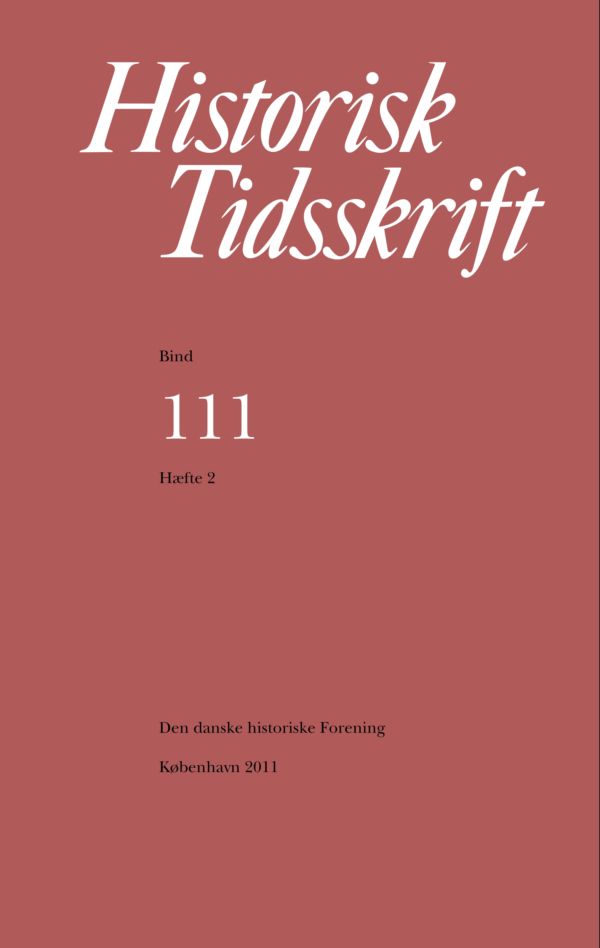Fængselskrøniken. Den hellige Jens Grands lidelser
DOI:
https://doi.org/10.7146/ht.v111i2.56524Resumé
The Prison Chronicle and the Sufferings of the Holy Jens GrandAbout 1300 AD the political landscape in Denmark was characterized by a conflict between King Erik VI Menved and Jens Grand, archbishop of Lund and the highest ranking prelate in the realm. In 1294 this led to Grand being imprisoned by the King’s men in the castle of Søborg in northern Zealand. A chronicle by an anonymous writer portrays Grand’s imprisonment, his escape and the following trial held in Rome before the Pope. Bonifacius VIII pronounced two different sentences in the case, in 1297 and in 1302, but the chronicle only covers the first. Traditionally, historians have not devoted much attention to the Prison Chronicle, probably due to the fact that the circumstances regarding its origin and transmission remain rather doubtful. The earliest version we still possess is a printed translation from Latin into Danish, carried out in 1599 by Arild Huitfeldt, a renowned historian of his age. He even added a beginning and an ending of his own device. These, however, are filled with mistakes and have further contributed to the confusion surrounding the text. Many have deemed its use as a historical source dangerous and complicated. By analysing the text, though, a great deal of knowledge on its date and place of origin can be inferred. It was written in Latin in the period after the first papal sentence, that of 1297, but before the next of 1302. The author was an ecclesiastical scholar attached to the holy chapter of the archbishopric of Lund. In writing the chronicle, he employed official documents, several of which are now long lost, as well as personal accounts by witnesses, including Jens Grand himself and other people from the archbishopric. In the second half of the 14th century the Prison Chronicle was used as an inspiration and source of information for parts of the Chronicle of the Archbishops of Lund. The Prison Chronicle portrays the archbishop as a figure akin to a living saint. His sufferings and subsequent restoration imitate the fate of an elevated martyr, except for the fact that Jens Grand survived his hour of trial. In terms of formal structure, the narrative takes strong inspiration from the hagiographic genre. As a saintly figure the English archbishop Thomas Becket – assassinated in 1170 precisely after a conflict with the King over ecclesiastical independence – seems to have been a personal favourite of Jens Grand and perhaps a model case for the chronicler. The hagiography-style composition and rhetoric do not indicate that the chronicler claimed canonization for Jens Grand – who at any rate was still alive and thus not eligible for sainthood. Rather, it was a poetic device used in an attempt to achieve the underlying, real purposes of the chronicle, which were of a political nature. The chronicle was part and parcel of the contemporaneous conflict between Jens Grand and the King. It sets out the views of the archbishopric’s holy chapter and tells their side of the story, especially emphasizing the – allegedly – outrageous injustices committed by the King in the course of events. Politically, the Danish archbishop lacked support from other sections of the Danish clergy, important parts of which openly supported the King. The Prison Chronicle was targeted at such an audience, susceptible to the mechanisms of the hagiographic genre. In order to influence public opinion amongst Danish clerics the writing of the chronicle was probably ordered by Jens Grand himself and the task entrusted to a reliable and competent person near him. The effort was unsuccessful, though. The sentence of 1297 was to the advantage of the archbishop, but did not bring the conflict to an end. The sentence of 1302 veered more to the side of the King, and soon after Jens Grand was removed from his position by the Pope and transferred to other duties elsewhere. More than for the holy chapter as such, the last sentence was a defeat for Jens Grand personally. The Prison Chronicle is an important text to exploit when working with the on-going political struggles between King and Archbishop in Denmark during this period. The obvious bias and its particular rhetorical articulation is in itself an interesting object of analysis. Furthermore, depending on further scrutiny, the chronicle may actually provide a quite reliable representation of specific events and their sequence.Downloads
Publiceret
Citation/Eksport
Nummer
Sektion
Licens
Ophavsret til bidrag i Historisk Tidsskrift tilhører forfatterne og Den danske historiske Forening som udgiver af Historisk Tidsskrift. For illustrationer gælder den ophavsret, som står anført i billedteksten. Ophavsretslovens almindelige bestemmelser gælder, hvilket vil sige, at ophavsretten gælder i 70 år efter forfatterens død. Bidrag i Historisk Tidsskrift må derfor, med forbehold for en ”moving wall” på tre år, frit downloades, læses, gemmes, anvendes og citeres (med kildeangivelse) i privat og videnskabelig sammenhæng, men de må ikke helt eller delvis genudgives af tredjepart, heller ikke i redigeret form, uden tilladelse fra forfatterne og Den danske historiske Forening. Henvendelse skal i så fald rettes til Historisk Tidsskrifts redaktion på histtid@hum.ku.dk.





